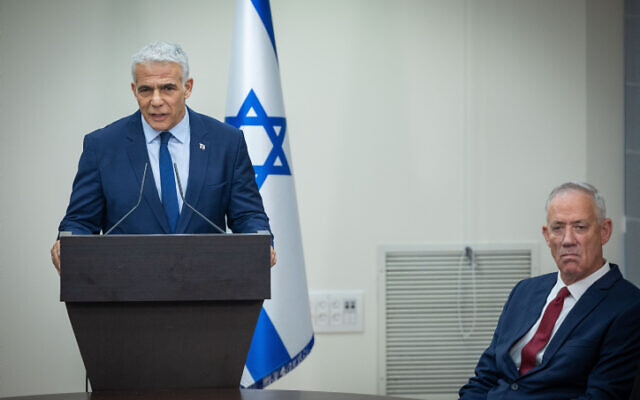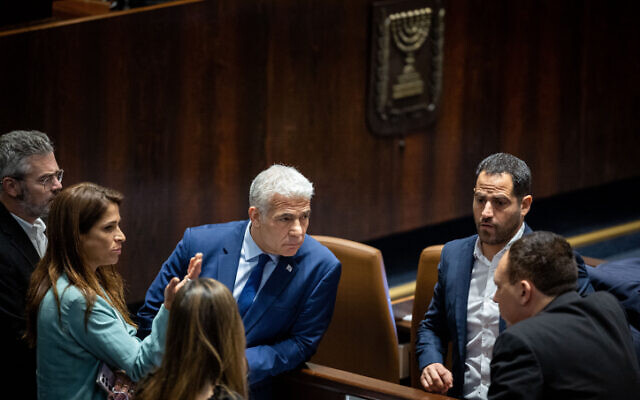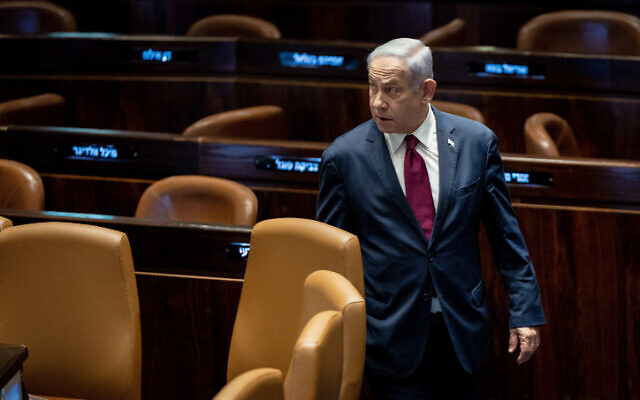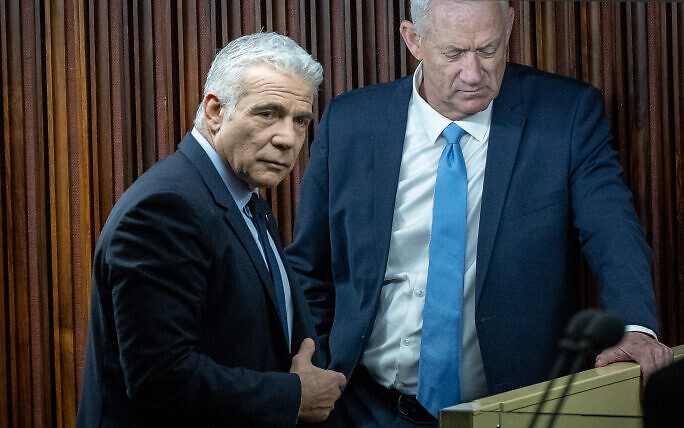Lapid, Gantz freeze overhaul negotiations over ‘PM’s capitulation to extremists’
Opposition leaders say they demand functioning judge selection panel if talks are to continue; Netanyahu accuses them of looking for an excuse to halt the process

At a joint press conference Wednesday evening, opposition leaders Yair Lapid and Benny Gantz declared they were freezing their participation in negotiations for consensual judicial reform, after the prime minister attempted — and failed — to put off a crucial vote to elect lawmakers to the country’s Judicial Selection Committee.
Though the premier’s convoluted efforts actually led to the opposition’s candidate being elected, and the coalition being left without a representative for now, Lapid and Gantz castigated Netanyahu’s very attempt to avoid staffing the key panel, and said they would not agree to negotiate so long as the committee remains unable to convene and carry out its duties.
The panel cannot meet until a second lawmaker representative is chosen, and even then, Likud’s Yariv Levin, who as justice minister chairs the committee, is reported to be threatening to block it from convening so long as his demands for radical changes to the process and curbing the courts’ powers are not met.
Lapid and Gantz said the committee’s inability to convene and oversee crucial appointments to the country’s judiciary demonstrated a violation of commitments Netanyahu had made to President Isaac Herzog as he shepherds the overhaul negotiations, and assailed his capitulation to “extremist” elements in his coalition.
According to both Yesh Atid and National Unity, Netanyahu made explicit promises to Herzog and the two political parties themselves that the Judicial Selection Committee would be convened in its current format with an opposition representative, in order to ensure the ongoing dialogue under the auspices of Herzog’s office would continue.
The opposition parties claimed on Wednesday that Netanyahu had broken his word, deepened mistrust and demonstrated he cannot deliver on his promises due to the pressure of hardliners in his coalition.
Netanyahu had attempted to delay the vote after facing intense pushback from hard-right elements from within his bloc over his desire to keep with tradition and allow the appointment of an opposition MK. He also faced a rebellion from a rogue Likud MK, Tally Gotliv, whose refusal to remove herself from the running, thus potentially skewing results, further complicated matters.
He then moved to have his side of the aisle vote down all candidates, which would have disqualified the vote and led to a repeat within 30 days’ time. But coalition MKs who broke rank in the anonymous ballot and supported opposition candidate Karine Elharrar enabled her election while Gotliv’s candidacy was shot down, handing the opposition a win while embarrassing the government.
Following the comments by Gantz and Lapid, Netanyahu for his part denied that he had made any promises to Herzog, and denounced the opposition for halting the dialogue, accusing them of looking for an excuse to blow up the talks even after an opposition MK was elected to the committee as they had demanded (regardless of his efforts to prevent it).
Elharrar was elected with 58 votes in favor and 56 against, meaning at least four coalition MKs voted for her, while Likud candidate Gotliv who refused to stand down despite being ordered to do so by Netanyahu received just 15 votes in favor and 59 against.

The election of only a single lawmaker to the committee meant it still cannot convene.
“Netanyahu today prevented the establishment of the committee, and put an end to the pretense that he wants dialogue,” Lapid declared following the vote.
“The committee has not been established, the threat to democracy has not been removed. Netanyahu knew exactly what the consequences would be. They were made clear to him by the president and by us. Without the Judicial Selection Committee [convening] we will not go to the president’s residence. No committee — no dialogue.”
Lapid said that Netanyahu had “promised the president [to establish the committee]” but “collapsed under the pressure of his partners,” pointing specifically to reform hardliner and Justice Minister Levin, as well as ultranationalist Finance Minister Bezalel Smotrich.

The Yesh Atid leader added that his party would “not stop fighting…until this awful government passes from this world.”
Gantz made similar comments, saying Netanyahu “capitulated to extremists” and said his behavior raised questions about his judgement on critical issues.
“It raises questions about his ability to control the coalition and live up to agreements. In the current circumstances in which the committee is not functioning as was promised, there is no reason to hold dialogue at the President’s Residence,” said the National Unity leader.
“Instead of working to defeat Tehran, Netanyahu chose to surrender to Yariv Levin. Instead of reducing the cost of living for Israeli citizens, he decided to bend the knee to Gotliv, Smotrich and [Otzma Yehudit leader Itamar] Ben Gvir,” added Gantz.
Netanyahu returned fire, accusing them of trying to block all judicial reform and of demonstrating a lack of goodwill.
“Today it is finally proven that Gantz and Lapid were looking for any way to blow up the talks,” said Netanyahu.

“Three months ago they said that if there was a timeout for the legislation they would engage in dialogue. We had a timeout but they didn’t engage in real dialogue. They rejected every proposal, even the most minimal ones our representatives presented at the President’s Residence.
“Yesterday, they went a different way and said that if their representative to the Judicial Selection Committee isn’t elected they would blow up the talks. But their representative was elected — and they still blew up the talks. So Gantz and Lapid don’t want real dialogue. Unlike them, I promise that we will act responsibly for the sake of this country.”
Earlier on Wednesday, the government’s cabinet secretary Yossi Fuchs further exacerbated tensions by briefly claiming that representatives for the opposition parties had agreed as part of talks to enable a mechanism whereby Shas chief Aryeh Deri could be reinstated as a cabinet member.
Deri was forced to give up his government posts earlier this year after the High Court struck down the ultra-Orthodox party leader’s appointment to the cabinet over his past criminal convictions and his since-abandoned commitment to leave politics.
Fuchs initially said the opposition had agreed to legislation that would stop the Supreme Court from using the judicial test of “reasonableness” for cabinet appointments, such as that which was used to ban Deri from holding office.
“We received from the other side an answer that if we want the agreement that we are putting together on reasonableness to include the appointment of ministers — and the meaning is that Aryeh Deri can return to the government — this is accepted,” Fuchs said during an interview with the Kan public broadcaster.
Opposition parties immediately blasted Fuchs’s comments as a fabrication.
“A complete lie,” said a spokesman for Yesh Atid, while National Unity called Fuchs’s claim “a pathetic lie.”
“The cabinet secretary should remember he’s a public servant and not a political activist who can spread fake news,” the latter party said in a statement.

Fuchs quickly backtracked, telling Galey Israel Radio that there “were no agreements” in the compromise talks.
And in a statement posted to Twitter, Fuchs stressed that “the sides have not yet reached agreements on any clause in the judicial reform.”









